Over the years, in our experience in website creation and development, we have encountered a very common and extremely costly problem for businesses, which is the use of multiple tools for creating a website.Therefore, we want to share with you why CMS Hub is the best way to create a functional website, which can be ready in days, and most importantly, with which you will save thousands of pesos by avoiding unnecessary spending on integrations or additional tools.
How much should a website cost?

The costs of a website vary according to its complexity, scope, and primarily, the CMS in which it is built. If we were to provide a range, we could say that the minimum cost can be around $300, and it can go up to $5,000.
1. Complexity
The complexity of a website refers to the variety and sophistication of the features and functionalities it includes. This can encompass:
- Interactivity: Sites with advanced interactive elements, such as custom calculators, interactive tools, or games, require more complex development.
- Third-party integrations: Including third-party services like payment systems, CRM, social media, or any other third-party service increases complexity.
- Custom functionalities: Any non-standard functionality (such as custom reservation systems, online learning platforms, etc.) requires specific development.
- Advanced responsive design: Designs that require detailed adaptation to different screen sizes and devices.
- Security: For sites handling sensitive information (like online stores), advanced security is essential and complicates development.
2. Extension
The extension of a website refers to its size and reach, including:
- Number of pages: A site with hundreds of pages will cost more than a small one with basic pages.
- Types of content: Sites requiring image galleries, blogs, forums, etc., have higher associated costs.
- Multilingualism: Sites needing to be accessible in multiple languages require more complex planning and execution.
- Updates and maintenance: A large site with content that needs constant updates involves higher recurring costs.
3. Software Used
The software on which a website is built also influences the cost:
- Content Management Systems (CMS): Platforms like WordPress, Joomla, or Drupal may be more cost-effective for basic needs. Still, it's always necessary to include paid extensions or plugins for additional functionalities that are regularly essential for a website, compared to CMS Hub, which is an all-in-one platform that we will talk about later.
- Development Frameworks: Frameworks like React, Angular, or Ruby on Rails are used for more customized and complex sites, which can increase costs due to the level of skill required to work with them.
- E-commerce Platforms: Platforms like Shopify, Magento, or WooCommerce (for WordPress) vary in price. Magento and WooCommerce may require additional development, while Shopify has a fixed monthly cost but less customization.
Considering everything we've seen, it might seem that creating a site on a CMS like WordPress is much more economical. However, it's essential to consider what it requires to create a truly functional one.
For example, with WordPress, you need to install:
- Hosting
- Theme
- Plugins
- Custom development and design
- Maintenance and security
- Forms
- Analytics
- And much more
On the other hand, although CMS Hub might seem to have a higher cost, the reality is that it includes numerous features and services, which can simplify management and potentially reduce long-term costs.
CMS Hub Costs

A website on the CMS Hub can cost anywhere from $997 to potentially reach $25,000. This does not include the CMS Hub subscription cost.
Let us explain the reason behind this wide range.
HubSpot's marketplace offers a variety of professional themes, including our award-winning Ocean Pro theme. The average cost of these themes is a significant factor to consider when looking to create a functional and customized website.
Equipped with tools for developing web pages, blogs, resource pages, and landing pages, these themes make it easier to generate more traffic and increase leads.
It is crucial to take into account associated costs, such as the time the team will invest in development, as well as the designers and content creators required. For example, using our Ocean Pro theme and theme creator support has a cost of $997. This support, common in most themes, can also extend to the CMS Hub.
If you choose to hire a third party to create your website, the cost can vary. For a small site with around 12 pages, the price could be $2,997.
However, this cost may increase depending on the complexity and number of pages. On larger sites with significant traffic, the cost could reach up to $25,000 due to the increased attention and professionalism required to manage multiple pages and complex aspects.
Additional Costs
Moreover, there are additional costs if you want to incorporate custom interactive elements on your website, such as a useful contact module like this:
(Insert Example Edenred)
These can vary in price from $200 to $1,500 or more, depending on their complexity.
An advantage to consider is that it is often not necessary to include all additions from the beginning. You can start with the essentials and, based on performance metrics, gradually add elements like interactive modules. In the case of the Ocean theme, it is possible to add unique modules tailored to your company's needs.
As for content, the cost may vary based on the required process. Ideally, it is recommended that the content for the website pages be created by the internal team, leveraging their knowledge and expertise in the company's value proposition.
Comparison of CMS Hub vs. Multi-Tool

Now let's compare the features of CMS Hub with some of the most well-known tools for creating a website, so you can see the full scope and versatility it offers.
| CMS HUB |
WORDPRESS |
JOOMLA |
DRUPAL |
TYPO 3 |
MAGNOLIA |
|
| Forms |
✓ |
x |
x |
x |
x |
✓ |
| Free Integrations |
✓ |
x |
✓ |
✓ |
✓ |
✓ |
| Landing Page Builder |
✓ |
x |
x |
✓ |
x |
✓ |
| Unlimited Web Page Creation |
✓ |
x |
x |
x |
x |
x |
| Blog Builder |
✓ |
✓ |
✓ |
✓ |
x |
x |
| No Code |
✓ |
x |
✓ |
x |
✓ |
✓ |
| SSL Certificate |
✓ |
x |
x |
x |
x |
x |
| Website Traffic Analytics |
✓ |
x |
x |
x |
x |
✓ |
| Advertising Campaigns |
✓ |
x |
x |
x |
x |
x |
| SEO Optimization |
✓ |
✓ |
✓ |
✓ |
x |
✓ |
| Default Themes |
✓ |
✓ |
✓ |
x |
✓ |
x |
| A/B Testing |
✓ |
x |
x |
x |
x |
✓ |
| Multilingual Content Creation |
✓ |
x |
✓ |
✓ |
✓ |
✓ |
| SEO Analytics |
✓ |
x |
x |
x |
x |
x |
| Simple Automation Flows |
✓ |
x |
x |
x |
x |
✓ |
| Smart Content and Reports |
✓ |
x |
x |
x |
x |
x |
| Custom Reports |
✓ |
x |
x |
x |
x |
x |
5 Main Competitors

As you could see in the previous table, CMS Hub offers a myriad of features, and we haven't even mentioned all of them.
That's why we've selected 5 of the main competitors of CMS Hub, and we'll delve a bit deeper into them so you can understand why using CMS Hub is beneficial.
WordPress

Average Price
WordPress is often said to be a free platform, but when considering everything needed to create a truly functional and SEO-friendly website, there are expenses involved.
The total cost to build a WordPress site will vary depending on the types of services and configurations chosen for the server and database.
Following standard options, the average price is expected to be around $450 per month to host the site on WordPress.
Advantages
- Versatility: WordPress is flexible enough to serve a wide range of website needs, from personal blogs and small business sites to e-commerce websites and complex enterprise portals.
- Customization with Plugins: There are both free and premium plugins available for WordPress, providing a range of functionalities. The official WordPress repository contains an extensive collection of over 50,000 free and freemium plugins, covering a multitude of needs and applications.
- SEO-Friendly: Plugins like Yoast SEO or All in One SEO Pack offer tools to optimize titles, meta-descriptions, and sitemaps. However, it lacks advanced SEO tools included in CMS Hub.
Disadvantages
-
Obligatory Use of Supplementary Tools: While highly customizable, WordPress often requires the use of additional plugins and themes to extend functionality and enhance design. Excessive use of plugins can negatively impact site performance, such as loading speed, and increase complexity and the learning curve for users.
-
Functionality Limits: Despite its flexibility, WordPress cannot achieve everything out of the box. Some specific or highly specialized functionalities may be out of reach without custom programming or external solutions.
-
Customization with Restrictions: Although themes and plugins offer a good amount of customization, there are limits to what you can do without coding knowledge.
-
Load and Speed: WordPress can be resource-heavy, especially with excessive plugin use or poorly coded themes, resulting in a slow website that negatively impacts user experience and search engine performance.
-
Security Risks: Vulnerabilities in the core of WordPress, outdated plugins, or themes can be exploited by hackers, compromising the security of the website.
-
Lack of Website Metrics Visualization: WordPress does not natively provide a platform to measure website performance. With WordPress, you need to install tools like Google Analytics, Chartbeat, or similar to track page views, conversions, etc. In contrast, CMS Hub is an all-in-one solution that allows you to measure, optimize, and grow your site's results.
Joomla
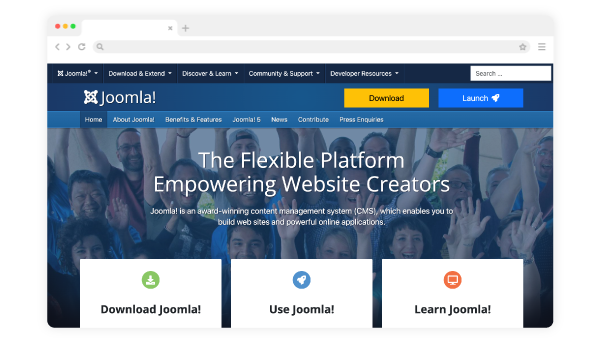
Average Price
- Personal Plan: $99 per month
- Business Plan: $199 per month
- Agency Plan: $399 per month
Advantages
-
Simplified Installation: Joomla offers a straightforward installation experience, guiding users through a step-by-step web wizard that simplifies the process, making it accessible even for those with limited technical knowledge.
-
Wide Catalog of Extensions: With thousands of free plugins and components available, Joomla allows users to expand and customize the functionality of their websites significantly, from content management to advanced e-commerce features.
-
Diverse Templates: The platform provides a variety of templates and themes, making it easy to change the visual appearance of the website.
Disadvantages
-
Not Ideal for Advanced Blogs: Joomla is not the preferred choice for those looking to create a fully-featured professional blog.
-
Fewer Extensions and Templates: While Joomla has a repertoire of templates and plugins, its library is not as extensive as WordPress, which may mean that for certain specific functionalities or integrations with other platforms, hiring a developer for a custom solution might be necessary.
-
Complex Administrative Interface: Joomla's admin panel is known to be comprehensive but can also be overwhelming due to the number of options and settings available.
-
Basic SEO: Users seeking high-level optimization might need to install additional extensions or make more manual adjustments in Joomla.
Drupal
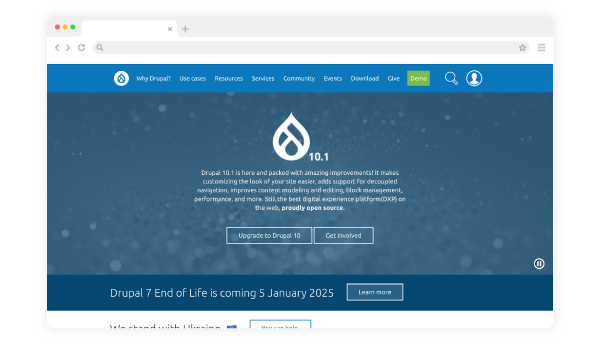
Average Price
- Annual Price: €29.88
Advantages
-
High Flexibility and Configurability: Drupal is exceptionally flexible, allowing developers to build anything from simple websites to complex web applications.
-
Customizable Graphic Design: It offers great freedom in terms of graphic design, allowing designers to implement unique and functional appearances without the limitations sometimes found in other CMS.
-
Integration with Other Platforms: Drupal excels in its ability to integrate with a wide variety of external platforms, further expanding its already considerable functionality.
Disadvantages
-
Steep Learning Curve: Drupal is known for its technical complexity, and its learning curve is steeper compared to CMS like Hub or Joomla.
-
Associated Costs: While Drupal itself is free, the costs associated with the development and maintenance of a site can be significant. Hosting, custom development, premium modules, and other professional services can increase the budget needed to keep a Drupal site operating efficiently.
-
Performance and Hosting: It can be more demanding in terms of hosting resources compared to other CMS, especially when managing a large amount of content or using many modules.
-
Limited Integration Options: It is not specifically designed to seamlessly integrate with marketing or sales platforms as CMS Hub does. Drupal users often need to search for and configure third-party integrations to achieve desired functionality in areas such as CRM, marketing automation, and data analytics.
-
Lack of Themes: Drupal has a more limited offering of themes compared to CMS Hub. Available themes are often less varied and may not reach the same level of graphic sophistication and ease of use.
-
Need for Custom Design: To achieve a unique and appealing design in Drupal, it often requires turning to a professional web designer. This involves additional effort and cost to tailor creativity to the specific needs of the site.
Typo 3
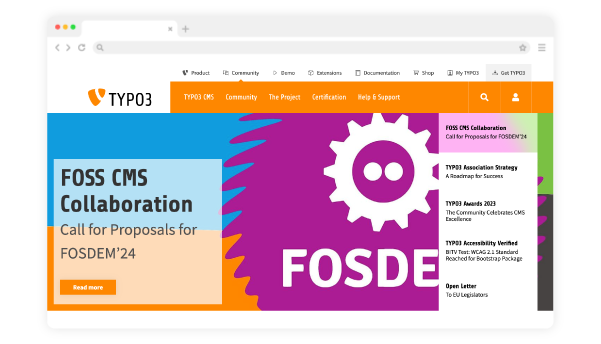
Average Price
- TYPO3 offers different types of memberships ranging from €7.92 per year to €12,500 per year.
Advantages
-
Extensive Programming Experience: Since TYPO3 is used in approximately half a million websites, there is extensive programming experience in creating pages with TYPO3. This means there is a large developer community and a wealth of resources available for those working with this CMS.
-
Easy Server Configuration: One significant advantage of TYPO3 is that server configuration is not complicated. This makes setting up a website easier, as the need for advanced technical knowledge in server configuration is minimized.
-
Ease of Programming: TYPO3 offers simple programming thanks to the ability to install the web server and edit content through the browser.
Disadvantages
-
High Server Requirements: TYPO3 demands more server resources to operate efficiently. This can be a drawback, especially for users with limitations in terms of hosting infrastructure.
-
Cumbersome Installation: Unless a quick installation option like Cloudbuilder Next is used, the TYPO3 installation process can be complicated and tedious, which may discourage less experienced users.
-
Limited Performance in Shared Hosting: TYPO3 does not offer optimal performance on shared hosting options, necessitating the need for a Virtual Private Server (VPS) or a Cloud Server for effective operation.
-
Complexity and Limited Documentation: The inherent complexity of TYPO3 makes its use, administration, and customization initially more challenging compared to more widespread systems.
Magnolia
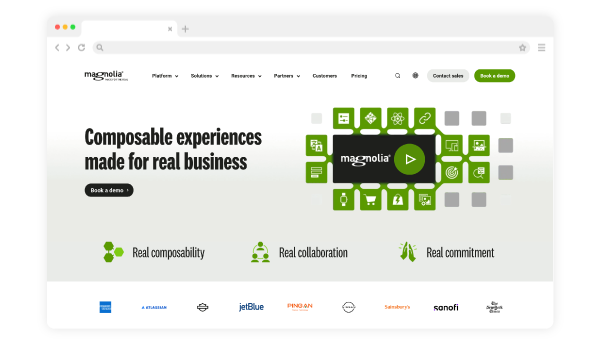
Average Price
- Depends on your needs; they provide a customized price.
Advantages
-
Comprehensive Digital Experience Management: Magnolia allows you to centralize the management of all your digital experiences on a single platform. This includes integrating various data sources such as content, commerce, digital assets, analytics, and other custom sources.
-
Customization of Technology Stack: Supports the creation of a modular reference architecture, allowing you to choose technologies, libraries, and programming languages that best suit your needs.
-
Easy Integration with New Technologies: Speeds up integrations through connector packages that enable connection with other digital systems.
Disadvantages
-
Complexity and Learning Curve: Due to its robust and modular nature, Magnolia can be challenging to handle, especially for those new to using advanced content management systems.
-
Implementation and Maintenance Costs: Being an enterprise solution, Magnolia may involve significant costs in both implementation and maintenance.
-
Technical Resource Requirements: To make the most of Magnolia, a technical team with programming and systems knowledge is necessary. This can be a challenge for small organizations or those without a dedicated IT team.
-
Dependency on Connectors and APIs for Integrations: Although Magnolia facilitates integrations through connectors and APIs, this can also become a dependency.
CMS Hub
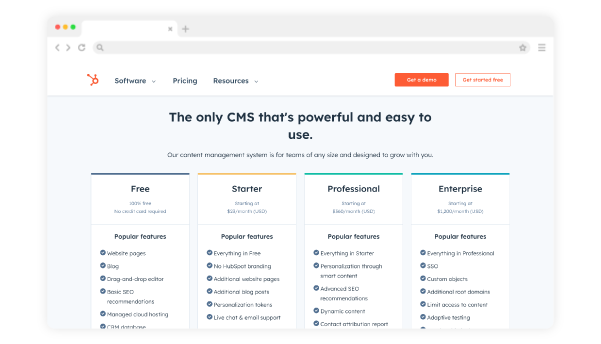
This platform, designed to meet the needs of both emerging businesses and established corporations, offers a range of functionalities that transform the way organizations create, manage, and optimize their online presence.
One of the most notable features of CMS Hub is its ability to integrate various tools into a single platform. This greatly simplifies website management, allowing users to access everything from content editing to traffic analysis in one place.
Additionally, CMS Hub stands out for its flexibility and adaptability, offering extensive customization options. This enables users to tailor their website to faithfully reflect the identity and specific needs of their brand. Whether through customizable templates or more advanced development options, companies can create unique and engaging experiences for their audiences.
With intuitive and user-friendly tools, it allows marketing and design teams to create and manage content without the need for extensive technical expertise.
Furthermore, it focuses on performance and security. With a robust and secure infrastructure, websites not only load quickly but are also protected against online security threats.
Finally, CMS Hub seamlessly integrates with other HubSpot tools, including CRM, marketing, and sales tools, providing a more comprehensive and unified view of the customer journey.
Why is CMS Hub beneficial for your company?

There are several reasons why it is beneficial for a company to use CMS Hub to manage its website, and here are some of them, in order of importance.
All-in-one Platform
HubSpot's CMS divides its set of tools for marketing, development, and IT.
- Ease of management for creating, editing, and continuously improving the website for marketing and design teams, allowing for the possibility of site improvement.
- Total flexibility for developers to create a functional website essential for a business or a complex website with interactive elements such as quoting tools, calculators, among others. With CRM as the foundation, these tools will help achieve more conversions and qualify business opportunities.
- Security and support from a top-tier support team with industry-leading technology providers.
- Avoid dependence on external parties for basic actions required when conducting A/B tests.
- Accurate metrics concentrated in one place from traffic source to business closure, allowing to understand which website content works best and which requires adjustments.
- SEO optimization that allows for specialized audits to detect marketing and development errors, impacting SEO on a large, medium, and small scale.
- Tools such as clusters for internal linking optimization, among many other functionalities.
Cost Savings
Using CMS Hub also has other advantages, such as saving on additional costs. For example:
- Reduction in the need for multiple tools: by integrating various functions (such as content management, SEO, data analysis, and marketing automation), it eliminates the need to subscribe to multiple specialized platforms.
- Operational efficiency: centralizing tools in CMS Hub improves operational efficiency. Fewer platforms mean simpler management and less time spent on training and administration of different systems, translating into savings of time and human resources.
- Reduced dependence on external developers: CMS Hub, with its user-friendly interface and easy-to-use tools, reduces dependence on external web developers or designers.
How have we helped companies grow with the help of CMS Hub?

We have streamlined technological management by having everything on a single platform, ensuring effectiveness in tools and agility in website delivery without additional expenses for plugins or necessary add-ons.
This approach has facilitated significant savings and prevented cost increases, even if the website experiences an increase in traffic, as the price of each CMS Hub version remains stable regardless of the number of visits your site attracts.
Furthermore, the success of our solutions is reflected in the ability to track every part of the website in detail. By combining lead generation and business management in one place, we have significantly improved conversion rates.
How HubSpot Themes Have Helped Businesses
Thanks to the themes HubSpot began implementing in 2021, such as Ocean Pro, creating a website is now much simpler and faster, taking a maximum of one month compared to 3 to 6 months.
This theme offers a wide range of combinations, with around 42 modules that have different versions.
Another factor is the cost, as approximately $5,000 was spent on creating a site previously, whereas with Ocean Pro, the cost is $1,000, and the site can last up to 30 years. This is because it can be updated each year with new modules, versions, and optimizations.
Similarly, companies no longer have to invest in other elements, as with Ocean, they can renew it year after year and integrate tools such as SalesForce, Asana, forms, dynamic pages, and more.
Finally, on the creative side, images, pngs, cbg, cbog, and even animated elements can be integrated.
With this, we invite you to join the growing list of companies transforming their digital presence with CMS Hub and Ocean Pro. With our platform, you will have the necessary tools to create a dynamic, efficient website tailored to your needs, ensuring the growth and success of your business in the competitive digital world.
Contact us today and take the first step toward optimizing your online strategy.

.png?width=319&height=267&name=gtmetrix_2023%20(1).png)




